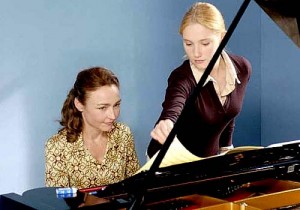The Page Turner – Precision, obsession, indignation, revenge

co-dependence
![]()
The Page Turner (La Tourneuse de pages) – Denis Dercourt
Steve McQueen argued one should feel as much as possible and show as little as possible. Whatever may be the merits of this idea for individual self-control, it is an oppressively apt definition of the cardinal emotional value of the bourgeoisie.
Melanie Prouvost is ten years old, the intense, talented pianist daughter of a butcher. While her father just wants her to enjoy her music, Melanie carries the burden of her mother’s aspiration for her into an important practical examination. Concert pianist Ariane Fouchecourt is one of the judges. As the nervous girl feels her way into her playing, Ariane disturbs her concentration by autographing a photo for a fan. Melanie waits until this disruption is over but cannot recover her composure and ruins the piece. Tears in her eyes she silently leaves with her mother, on the way out displaying a malicious, sinister flash of temper towards one of the other pianists. She resolves never to play again.
About ten years later, now a beautiful young woman, Melanie takes up a junior post in a major law firm, headed up we discover by Jean Fouchecourt, Ariane’s husband. Melanie’s relentlessly impassive demeanour is unnerving and convinces us that her choice of employer was no accident. Her outwardly demure, ever-obliging manner carries a palpable air of menace. When Jean needs someone to look after his son Tristan while Ariane prepares for an important concert, Melanie subtly insinuates herself into the role and their house.
Since a car accident when someone unknown simply drove straight into her, Ariane has lost her confidence, which manifests itself in stage fright. Because of this, the trio with whom she plays is struggling to maintain their reputation. Melanie’s apparently submissive, respectful competence begins to draw her closer to Ariane. Without being asked, she begins to turn the music pages for the nervous older woman. Her quiet assurance calms Ariane whose confidence begins to build, based upon Melanie’s emotional and practical support. Against the wishes of her friend Virginie, violinist in the trio, Ariane insists on Melanie turning pages for her at the upcoming radio concert.
There is an airless, repressed tone to this tense, claustrophobic psychological thriller. Director Dercourt meticulously builds up an atmosphere where absolute emotional control is a necessity. His stealthy almost imperceptible cinematography is so effective that we share a sense of dread that real emotion is about to shatter the smooth surface of Ariane’s wealthy, rigorously ordered life.
With manipulative self-abnegation Melanie makes herself increasingly indispensable to Ariane’s self-confidence and emotional equilibrium. The balance of emotional power gradually shifts from the wealthy, accomplished but vulnerable older woman to her implacable, secretly determined young employee. Melanie intensifies this dependency by actions with increasingly sexual undertones. We are reminded of Melanie’s underlying malicious intentions when she responds to the sexual advances of Laurent, the trio’s cellist with a sudden, coolly executed, shocking act of violence. She finally exacts her revenge on Ariane in a way that turns all of the older woman’s bourgeois superiority and complacency against her.
In its subtle, multi-layered form Dercourt’s film has much in common with Haneke’s Cache (Hidden). In both, an apparently small act has a profound affect on someone’s life. Like Haneke, Dercourt wants to reveal the fragility of bourgeois personal repression and its vulnerability to any intrusion of real, powerful emotion, especially violent or sexual. If Haneke operates on a wider social and political canvas, the forensic intensity of Dercourt’s insinuation of threat and menace into the heart of a wealthy privileged family has a power of its own. Both work well on the thriller level even if Dercourt’s film achieves a resolution of a kind that Haneke rejected.
Ariane’s was a quintessentially middle class offence – discourtesy and impoliteness. Melanie’s emotional response and sense of shame, having no means of outward expression, goes inwards, generating a disturbingly disproportionate response. Where control is all, manipulation is the only form of release. Melanie’s lack of scruple both physical and emotional, and Ariane’s fear that Jean will cut her off without a penny if he discovers her feelings for the girl, remind us of the ruthlesssness with which the Middle Class amass wealth and their implacable determination to retain it. There is steel behind that ineffable politeness and it is very disturbing when one runs into it for the first time.
Catherine Frot (Ariane) and a remarkable performance by Deborah Francois as Melanie, are quite superb. Both convey a powerful sense of inner passion and turmoil behind the impassive masks of middle class control. Many of the family scenes especially those with the young son, Tristan set ones teeth on edge at the substitution of a relentless concern for middle class rituals of politeness at the expense of natural human warmth and intimacy. We may ironically mock the idea that wealth cannot buy happiness but The Page Turner reveals a real sense in which there may be some truth in the platitude. There is sense that in becoming the kind of single-minded person able to amass wealth, you become the klind of person who can’t enjoy it.
(November 2006)
Filed under: 4 stars, Denis Dercourt, Drama, Europe/World cinema, General, Musical, Philosophical, Political

